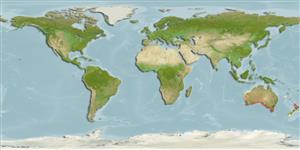>
Blenniiformes (Blennies) >
Blenniidae (Combtooth blennies) > Salariinae
Etymology: Parablennius: Greek, para = the side of + Greek, blennios = mucus (Ref. 45335).
More on author: Richardson.
Issue
Junior synonym Parablennius maoricus (Kner, 1864), is considered valid in Patzner et al., 2009:458.
Environment: milieu / climate zone / depth range / distribution range
ນິເວດວິທະຍາ
ສັດທະເລ; ນ້ຳກ່ອຍ ກ່ຽວກັບ (ຢູ່)ເທິງຊັ້ນພື້ນດິນໃນທະເລເປີດ. Temperate
Eastern Indian Ocean (Australia) to Southwest Pacific (New Zealand).
ຂະໜາດ / ນ້ຳໜັກ / Age
Maturity: Lm ? range ? - ? cm
Max length : 13.0 cm TL ຕົວຜູ້/ບໍ່ມີເພດ; (Ref. 9002)
Short description
ຕົວທີ່ໃຊ້ໃນການຈຳແນກຊະນິດ | ສະລີລະວິທະຍາ | ການວັດແທກຮູບຮ່າງລັກສະນະພາຍນອກຂອງດິນ,ສັດ,ປາ…
ຄີ (ໜາມ)ແຂງຢູ່ຫຼັງປາ (ທັງໝົດ) : 12; ຄີຫຼັງຂອງປາ (ຄີອ່ອນ) (ທັງໝົດ) : 16 - 19; ຄີ(ໜາມ) ແຂງຢູ່ຄີກົ້ນປາ
ກຸ່ມປາກະດູກແຂງ
ຄວາມຖີ່ຂອງກຸ່ມຖ່າຍທອດພັນ
ປາທີ່ມີການເຄື່ອນຍ້າຍຈາກທະເລໄປຫານ້ຳຈືດ ແລະນ້ຳຈືດຫາທະເລ
ປາທີ່ມີການເຄື່ອນຍ້າຍຈາກທະເລແລະໄປໄຂ່ຢູ່ນ້ຳຈືດ
ຄີກົ້ນຂອງປາ
ສັດທີ່ມີກະດູກສັນຫັຼງ
ການຖ່າຍທອດທາງກຳມະພັນຈາກພໍ່ແມ່ຫາລູກ: 2; ຄີກົ້ນຂອງປາ: 19 - 20. Dorsal fin with slight notch over posterior spines; caudal and pectoral fins rounded. Pale to ash-grey in color; young with moderate-sized dark blotches along sides; adults finely spotted (Ref. 9002).
Facultative air-breathing in the genus (Ref. 126274); Adults are found in rock pools and shallow estuaries, commonly under jetties along tops of pylons (Ref. 9002). Oviparous. Eggs are demersal and adhesive (Ref. 205), and are attached to the substrate via a filamentous, adhesive pad or pedestal (Ref. 94114). Larvae are planktonic, often found in shallow, coastal waters (Ref. 94114).
Life cycle and mating behavior
Maturities | ການສືບພັນ | Spawnings | Egg(s) | Fecundities | ຕົວອ່ອນ
Oviparous, distinct pairing (Ref. 205).
Kuiter, R.H., 1993. Coastal fishes of south-eastern Australia. University of Hawaii Press. Honolulu, Hawaii. 437 p. (Ref. 9002)
IUCN Red List Status (Ref. 130435)
Threat to humans
Harmless
Human uses
ເຄື່ອງມື
Special reports
Download XML
ແຫຼ່ງອີນເຕີເນັດ
Estimates based on models
Preferred temperature (Ref.
123201): 14.2 - 22.8, mean 17.8 °C (based on 394 cells).
Phylogenetic diversity index (Ref.
82804): PD
50 = 0.5000 [Uniqueness, from 0.5 = low to 2.0 = high].
Bayesian length-weight: a=0.00741 (0.00335 - 0.01640), b=3.02 (2.83 - 3.21), in cm total length, based on LWR estimates for this (Sub)family-body shape (Ref.
93245).
ຊັ້ນເຂດຮ້ອນ (Ref.
69278): 2.8 ±0.1 se; based on size and trophs of closest relatives
ຄວາມຢືດຢຸ່ນ (Ref.
120179): ສູງ, ປະຊາກອນຕຳ່ສຸດທີ່ໃຊ້ເວລາສອງໜ້ອຍກວ່າ 15 ເດືອນ (Preliminary K or Fecundity.).
Fishing Vulnerability (Ref.
59153): Low vulnerability (10 of 100).
Nutrients (Ref.
124155): Calcium = 78.9 [37.3, 158.6] mg/100g; Iron = 0.36 [0.21, 0.69] mg/100g; Protein = 17.5 [16.4, 18.5] %; Omega3 = 0.392 [0.166, 0.866] g/100g; Selenium = 7.97 [3.19, 19.57] μg/100g; VitaminA = 32.7 [9.2, 109.1] μg/100g; Zinc = 1.22 [0.81, 1.82] mg/100g (wet weight);
